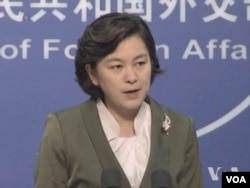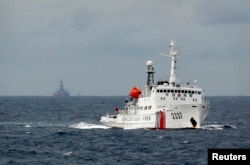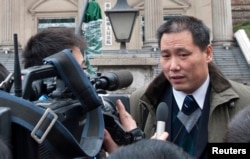China says it hopes to improve bilateral exchanges and ties with the United States. The comment from the Foreign Ministry in Beijing Thursday came in reaction to the first public statements by new U.S. Ambassador to China, Max Baucus.
In his first public statement on U.S.-China relations since assuming his post, Baucus said China needs to improve human rights, stop blocking U.S. firms from entering Chinese markets and stop the cyber theft of trade secrets.
China’s Foreign Ministry spokesperson Hua Chunying responded that strong bilateral ties between the two countries would improve peace and stability throughout the region.
On Baucus’ charges of cyber theft she said China and the U.S. are two big countries with big social systems and backgrounds and the key is to treat and handle these differences properly.
South China Sea disputes
Tensions between the United States and China have risen over a number of issues this year including cyber security and territorial disputes in the South China Sea. China claims nearly all of the resource rich waterway; its neighbors in Asia also claim parts of the sea. Earlier this year violent protests erupted in Vietnam over a Chinese oil rig in the area.
“The territorial disputes in the East China Sea and the South China Sea between China and some U.S. allies, and those issues really add tensions to bilateral relations and also increase the distrust between the two sides,” said Wang Dong, a professor of International Relations at Peking University.
Cyber theft
The U.S. indictment of five People’s Liberation Army officers on charges of cyber theft earlier this year also damaged relations between the two countries. Ambassador Baucus said China’s cyber theft of trade secrets threatens U.S. national security.
Wang Dong says that the U.S. charges have also been counter-productive.
“I think it’s very important for the United States to take actions and measures to really come back to the track of cooperation and in a more constructive way,” he said.
Human rights
Ambassador Baucus also spoke of the arrest of “moderate voices,” activists and dissidents by the Chinese government this year. Pu Zhiqiang, a prominent Chinese lawyer, was arrested earlier this month for “creating disturbances.”
Baucus said a priority for him would be pushing for a bilateral investment treaty. The United States has similar investment treaties with 40 other countries.
Treasury Secretary Jack Lew and Secretary of State John Kerry may make headway on some of these issues when they meet with Chinese officials in July in Beijing for the Strategic and Economic Dialogue.
















